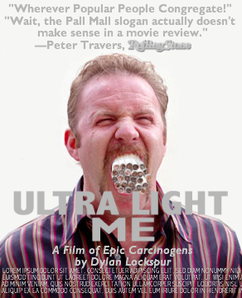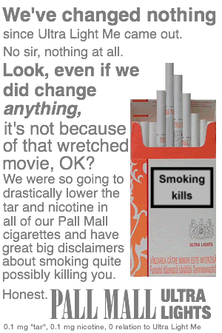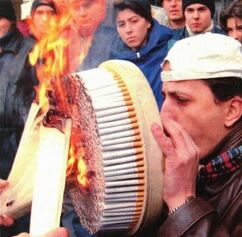Ultra Light Me
| Ultra Light Me | |
|---|---|
 | |
| Directed by | Dylan Lockspur |
| Written by | Dylan Lockspur |
| Produced by | all together now—Dylan Lockspur |
| Starring | Dylan Lockspur |
| Distributed by | sMcJesus Films |
Running time | 98 minutes |
| Languages | mostly mild, but can be very harsh |
| Budget | however much it cost to buy all of those cigarettes |
| IMDb page | |
Ultra Light Me is a 2014 documentary film by American independent filmmaker Dylan Lockspur. The film follows a 365-day time period—more commonly known as a year (specifically, the year of 2013)—during which he smokes at least one pack of Pall Mall Ultra Light cigarettes a day, and documents the severe effects this lifestyle has on Lockspur psychologically and physically.
The reason for Lockspur's experimentation with tobacco was its continuing presence even in developed countries as a health hazard and prevalent addiction, even resulting in various lawsuits. This impels Lockspur to point out how criticisms levelled against fast food companies often apply to tobacco manufacturers as well.
Synopsis[edit | edit source]
| “ | Where does personal responsibility stop and corporate responsibility end? Is smoking really that bad for you? I mean, what would happen if I smoked nothing but a pack of Pall Mall Ultra Lights for 365 days straight? Would I suddenly be on the fast track to becoming a dead American? Would it be unreasonably dangerous? Let's find out. I'm ready. Ultra Light me. | ” |
— Dylan Lockspur, recklessly kickstarting the film
| ||
The film begins with Lockspur in prime physical condition—32 years old, 190 centimetres tall, 80 kilograms, even above average shape according to his Wii Fit Plus trainer, and with a real-life girlfriend, which is more than can be said for many others. He consults three doctors about his proposed experiment, and all three doctors—a proctologist, a coroner, and a doctor of high-energy physics—agree that the experiment will have unwelcome effects on his body, but nothing too severe, the physics PhD even citing the human body as "kind of gross anyway".
Experiment[edit | edit source]
Lockspur begins the experiment with a pack every day, bought from his local newsagent. He also adjusts his lifestyle accordingly to suit the average citizen of a developed country, walking five to ten thousand paces a day, commuting to work in massive traffic jams, and being ignorant of the industrial and unhealthy nature of his diet and environment. After a month or so, he begins to experience bouts of disinterest and migraines relieved by cigarettes, leading his proctologist to dub him "addicted".
After a month, his girlfriend dumps him, by which point Lockspur has already proven his point to most people. However, Lockspur continues, and by the end of six months, he loses all sense of taste and smell. He has also been steadily increasing his daily dose of nicotine, smoking through fifteen packs of Ultra Lights on certain days.
After eight months, Lockspur begins to suffer from heart palpitations. He finally reveals that he has various risk factors that make him extremely vulnerable to lung cancer from smoking, and that family and friends are beginning to express some concern in the form of attempting to forcibly have him put in a mental asylum. His doctor of physics strongly advises that he quit smoking immediately, since the tar building up in his body may have some side effects.
Completion and aftermath[edit | edit source]
Lockspur completes the twelve-month experiment, and collapses into his sixth pack of the final day. By now he is a chain smoker, smoking at least five packs of Ultra Lights a day. All three doctors—seeing him in the emergency room—are wildly surprised when he is diagnosed with lung cancer, and is given six months at maximum to live.
Text at the end of the movie says that Lockspur died in April 2014, and appeared to mildly regret the experiment. A funeral was held in private, and Lockspur's ex-girlfriend did not attend. The movie ends with Lockspur saying through a mechanical larynx, "Who do you want to see go first: me or them?" followed by a photograph of his tombstone.
Release[edit | edit source]
Despite Lockspur's death, his final will provided for the release of the movie in North America and Europe. The Motion Picture Association of America initially rated it NC-17 for its "gratuitous depiction of tobacco smoking and strong deathly situations, including depiction in detail of a gravestone"; however, it bowed to public pressure and lowered the rating to an R. The British Board of Film Classification, not wishing to appear as prudish, gave it a rating of 18 rather than R18.

Marketing initially seemed to imply the film was a snuff film, depicting the actual moment of Lockspur's death; however, this appears to have been a misunderstanding on the part of the general public, as it merely depicts Lockspur discussing smokeless tobacco. Nonetheless, the film was a large hit in no way whatsoever due to a craving for Schadenfreude, grossing $20,642,054 worldwide; however, this meant nothing because, due to extreme inflation, this barely covered the cost of the ink used to print a single poster of the movie.
Reaction[edit | edit source]
Critics of the film, including Pall Mall's manufacturer, argue that the late Mr. Lockspur intentionally smoked a large number of cigarettes—most certainly not in any way due to the nicotine addiction spurred on by his experiment—and that the results would have been the same regardless the source of tar and nicotine. Many have also stated that Lockspur's various risk factors contributed more to his premature demise than the smoking itself, and have carried out alternative experiments in an attempt to prove this, often incorporating other types of deaths such as by heart disease. Subsequently, the prevalence of lung cancer in North America and Europe rose 150%, since these experiments were no less reckless or unhealthy than Lockspur's original.
Some have even alleged that Lockspur merely faked his own death as a publicity stunt; no copies of Lockspur's death certificate have as of yet been released, and critics such as Roger Ebert have repeatedly cast suspicion upon the veracity of his demise. However, Lockspur's estate have expressed concern and disapproval regarding this insensitive treatment of Lockspur's sacrifice, and Lockspur himself has frequently come out at awards events and screenings to personally support these assertions.

